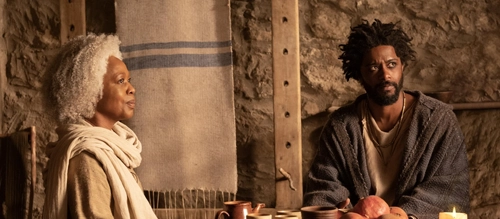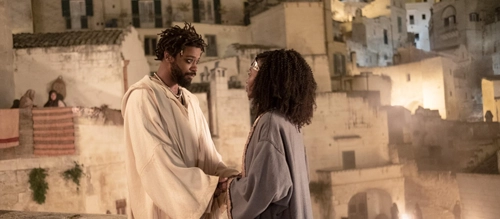The Book of Clarence (2023) Review

The Book of Clarence (2023)
Director: Jeymes Samuel
Screenwriter: Jeymes Samuel
Starring: LaKeith Stanfield, RJ Cyler, Omar Sy, Anna Diop, Marianne Jean-Baptiste, Micheal Ward, Caleb McLaughlin, Alfre Woodard, James McAvoy
At the height of the Hollywood golden age, one of the staples of cinema was the Biblical Epic. From The Ten Commandments and The Greatest Story Ever Told to Ben-Hur, the swords and sandals epics either adapted Christian Scripture or existed adjacent to it, like the latter. Since then, other films have been made in the same vein, from satirical comedies like Life of Brian to apocalyptic action movies like Noah, or Exodus: Gods and Kings. Now, British writer-director Jeymes Samuel brings all the style that made his debut The Harder They Fall so fascinating, and applies it to this genre with The Book of Clarence.
The Book of Clarence follows the titular Clarence (LaKeith Stanfield), a good-for-nothing stoner slacker and drug dealer, who lives in lower Jerusalem in 33 AD. He’s the twin brother of the Apostle Thomas (Stanfield dual-plays the roles), but resents his brother for leaving their mother Amina (Marianne Jean-Baptiste) to follow Jesus. The brothers are posited as binary opposites, particularly in their approach to belief and faith – Clarence is a self-proclaimed rational unbeliever, whereas Thomas has given everything to be a disciple. After losing a chariot race with a pre-reformed Mary Magdalene (Teyana Taylor), Clarence and his best friend Elijah (RJ Cyler) find themselves in heavy debt to the local gangster Jedediah the Terrible (Eric Kofi-Abrefa), who also happens to be the sister of the object of Clarence’s affections Varinia (Anna Diop). At a loss over what to do to make back the money he owes, and inspired by an opium-trip, Clarence plots to trick people into believing that he is the new Messiah, attempting to replicate and capitalise on the infamy of his contemporary Jesus of Nazareth (Nicholas Pinnock). Alongside Elijah, the freed slave Barrabas (Omar Sy), and young cart-driver Dirty Zeke (Caleb McLaughlin), this band of brothers take on the challenge to become a Messiah to the people, with Clarence’s repeated mantra in his sermons being “Knowledge is stronger than belief.”
It’s a fun concept, but its execution is messy to say the least. The film is split into three distinct chapters, or books, each led with a title-card fashioned after the ones in The Ten Commandments. Each book has a different tone, and the pacing between the three leaves the film overwrought yet underdeveloped. It tries to be a multitude of things: a satirical comedy, a delicate forbidden love story, a gangster tale, a meditation on faith versus knowledge. However, in its bid to be everything, it struggles to feel settled in any of them. Particularly jarring is the film’s opening stance that seems to critique belief and faith, to its end act where its portrayal of Jesus seems to be that of the devout. Neither are bad stances for a film to have, but the transition between the two could be considerably smoother.

Even so, what The Book of Clarence lacks in substance, it makes up for with its undeniable, visceral style. Even when the story drags or loses sense, everything on screen is unbelievably cool to watch. The film was shot in the historical quarters of Matera in Italy, and it works brilliantly as a stand-in for Jerusalem. The choice to use locations rather than soundstages makes a tangible difference to the world building – this town feels distinctly lived in by these characters, and the attention to the details of everyday life in this community (even when they aren’t historically accurate) feel authentic to them. This is heightened by excellent costume design by Antoinette Messam, which parallels artistic depictions of Christ and his followers, but also draws on the African ancestry of Samuel and his cast.
As with The Harder They Fall, Jeymes Samuel doubles up as composer, and his R’n’B and gospel-infused score adds to the vibrant and dreamlike atmosphere. As Clarence and his friends take their drug-fuelled trips, the music takes us there with them. A particular highlight is a surreal dance sequence set in an ancient club – it takes you out of the established place, but it’s a fun time as it does so.
The other aspect that levels up the The Book of Clarence is its stellar cast. LaKeith Stanfield showed what he could do in surrealist film when he appeared in Sorry to Bother You, and his performance (well, performances, since he’s playing twins) reiterates how adept he is at it. There is a distinct charisma to Stanfield that makes him the perfect person to play a burgeoning false Messiah; there is also a vulnerability that offsets this to make Clarence seem like a real, flawed human being. As the main love interest Varinia, Anna Diop is gentle and compassionate, and utterly compelling. Omar Sy (The Takedown) brings a soft yet towering strength as Barrabas, while Caleb McLaughlin evokes intrigue at what his post-‘Stranger Things’ career could look like. Nicholas Pinnock plays Jesus with both warmth and authority. Veterans like David Oyelowo and Alfre Woodard make the most of limited screen time to make an impact with their fantastical portrayal of key Biblical figures. A mention must also go to Benedict Cumberbatch, whose cameo-style inclusion lands one of the best jokes in the whole film. The cast as a whole is used intentionally, inserting black bodies into the Biblical genre, repeating what Samuel sought to do previously with Westerns.
Jeymes Samuel is a filmmaker that has a clear vision; unfortunately, he is unable to communicate that well narratively. However, Rob Hardy’s dynamic cinematography ensures that Samuel’s vision excels aesthetically. The Book of Clarence is a visually pleasing watch, even if the story will leave you shrugging your shoulders and asking follow-up questions, much like Clarence and Elijah on their visit to the apostles. It has got some great moments, and a strong ensemble gives it a good go, but it needed refinement to achieve the status of Biblical ‘Epic’.
Score: 15/24
Written by Rehana Nurmahi
You can support Rehana Nurmahi at the following links:
Twitter – @Han_notsolo
Letterboxd – hana_banana97
Portfolio – Authory

